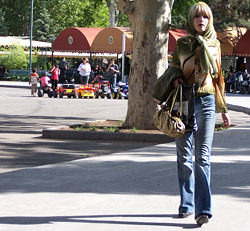After the “Investigative Journalists’” office prohibited smoking, I finally understood why the word “ensemble” has turned into “grouping” in Armenian (hamuyt). It seems that the smoking prohibition and the Armenian translation of “ensemble” have nothing to do with one another: Really, what’s the point? But when you’re forced to go up to the roof of one of the high-story buildings of Yerevan and take a look at the city, you start to think about many things starting from cursing ending with etymology.
As far as I know, “ensemble” is defined as the harmonious grouping of things. For example, take the song/dance ensemble, where, let’s say, the banjo player can’t play one thing and the Armenian kyamancha player can play another…or the singer sing in one tone, which is different from the tone the orchestra is playing in. For example, the ensemble of architecture-it doesn’t put up with something inharmonic. There also exists an ensemble of clothing which, if the woman understands a little about, won’t wear a velvet evening dress with sneakers, even if that’s the most well-known brand out there.
Now, as I look at the city from one of the high-story buildings located in the center of the city, I try to find one example of an architectural ensemble, which will show at least one trace of Armenians as architects/constructors and I just don’t find any building. Then I realize that the word “grouping” in Armenian (hamuyt) wasn’t made up with the purpose of using that word instead of “ensemble”, but rather to distract the attention of the person trying to find harmony.
Before you think about what the words “ham” and “uyt” (“group” and “ing”) mean, the municipality will permit the construction of buildings, a couple of roofs will turn into a flat surface area and the balcony of homes will simply be a space to live in. Before all that happens, Armenians will understand that in the word “hamuyt” (grouping), “ham” and “uyt” are just the prefix and suffix and only rebellious Armenians can form the word without a root just for the sake of not using foreign words.
For example, an Armenian middle school of Armenia, which in fact is named after the Dashnak literary critic, and the strip tease bar located near the school, can’t be considered an ensemble based on all norms, but Armenians can see this incompatibility for the past couple of years now. Or how about the synthesis of a naked woman and brandy in the heart of the city (the name of the brandy is in fact called “Mashtots” and in Russian)? You go up to a flower shop to buy flowers; they show you some “grouping” of flowers and as you pick a rose from the bouquet, it’ll remind you of acid. In order to praise the product he’s selling, the seller will say that the ensemble of the “flowers” was the idea of the florist. All you hear is groupings. The field of urbanization is about grouping, services are groupings, there is grouping in politics and society too.
Take the governmental coalition…how is that cocktail of parties not an ensemble? Three parties unite to come to power, but throughout the course of time (or at the right time),, the first gets rid of the second, while the third hints that the first is “criminal” by making the people agree.
The oppositionist alliance…how is that cocktail of parties not an ensemble? Various parties unite with the purpose of trying to restore constitutional order, but since each activist envisions that in his own way, they start to get happy about things of little significance, for example, the National Assembly President considering a voting invalid. What about Armenia’s foreign politics?…Even the Irish would dream of having an ensemble like that; after all, the Irish are known for their harmonious and rhythmic dances. After handing everything over to the Russians and not even getting a thank-you, Armenia sends troops to Iraq to join the war that’s on the verge of ending and hope that by doing that Armenia will help join the railway connecting Turkey and Azerbaijan and that railway is Armenia’s last chance to evade isolation.
The entire republic is a grouping because the capital city is developing at such a rapid pace that you start to think that pretty soon the Armenian government will sell the rest of the territories of Armenia to its neighbors, except of course Tsakhkadzor and Sevan where the president, ministers, deputies and oligarchs ski and ride in boats.
The people are a grouping because the price of the limousine of a rich man getting married costs more than the budget of an entire province of Armenia; the expenses for a wedding exceed the contribution of a Diasporan Armenian aimed towards the construction of a school in Armenia by a couple of times.
This is how we Armenians live, pretending that we have a state, thinking that we’re a society, imagining that we can become a democratic country and have a civil society.
Each time I read the poem called “Mahvan Tesil” (Vision of Death) written by Yeghishe Charents dedicated to Alexander Tamanyan, I always come across a word, which sounds unfamiliar to me and have always thought that a great poet like Charents couldn’t have written that word by chance. “He has probably seen a sunny city”-in this line the key word is “probably”. Why “probably? Why would Charents, who had most probably seen Alexander Tamanyan’s project plans and talked to him, doubt that? That “probably” is the grouping, which the poet couldn’t configure because back in those days, Armenians hadn’t found the Armenian word for ensemble for the sake of keeping the Armenian language clean or perhaps for the sake of the truth.

